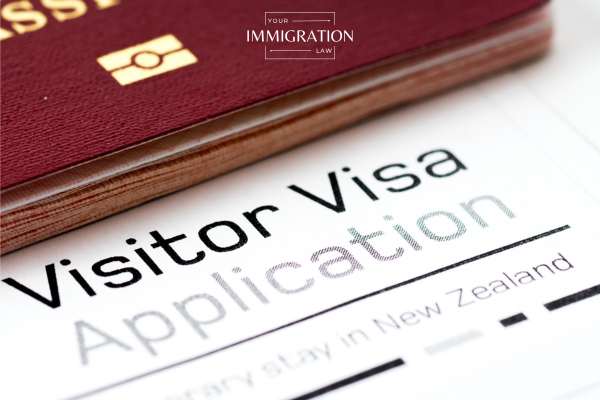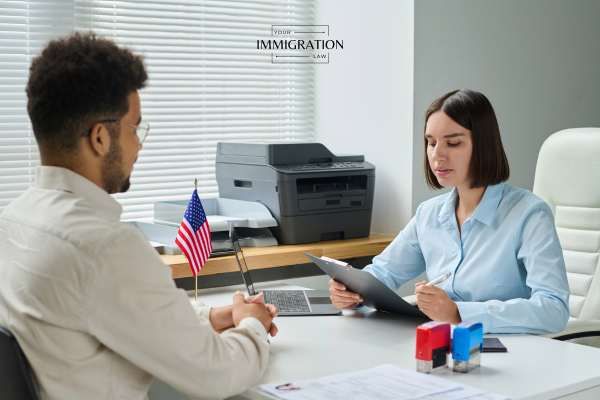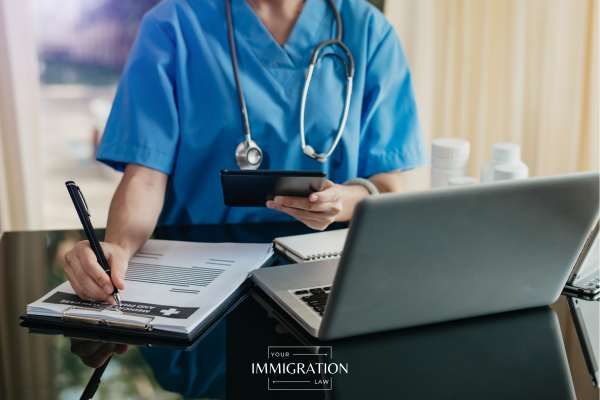Seeking medical treatment in the U.S. is often a critical choice for many foreign nationals, as the U.S. is home to some of the world’s most advanced healthcare facilities and specialists. Whether patients seek cutting-edge treatments, specialized care, or life-saving procedures, the U.S. attracts individuals from foreign countries seeking superior medical services.
However, before receiving medical care in the U.S., patients must navigate the visa process to gain entry. One of the most common visa types used for medical purposes is the B-2 visa, which allows temporary entry into the U.S. for personal reasons, including receiving medical treatment. Sometimes, travelers may use a B-1 or B-2 visa, which combines tourism and business purposes, but the B-2 visa is most appropriate for medical care.
If you’re unsure where to start or need guidance on securing a U.S. visa for medical treatment, Your Immigration Law can help. Contact our visitor visa lawyers today for personalized support and to begin the application process. Call us at (313) 631-8080 to get started.
B-2 Visa Overview
The B-2 visa is a non-immigrant visa that permits foreign nationals to enter the U.S. temporarily for personal reasons, including medical care, tourism, and visiting family. The B-2 visa differs from the B-1 visa, which is primarily for business-related travel, such as attending meetings or working with business associates. However, both visas can be combined under the B-1 and B-2 visa categories. These categories of visas cover both business and tourism purposes.
The B2 visitor visa allows individuals to enter the U.S. specifically for personal reasons, such as receiving medical treatment, while adhering to the regulations set by U.S. immigration authorities. It is essential that foreign nationals holding B visas stay informed about their travel status through the EVUS - Electronic Visa Update System, which is required for certain travelers to keep their information current before visiting the U.S.
Definition and Purpose
A B-2 visa is a nonimmigrant visa designed for foreign nationals who intend to stay in the U.S. temporarily. It is intended for people who are staying for personal reasons, such as tourism, family visits, or medical care. For individuals seeking medical treatment in the U.S., the B-2 visa enables them to access care at a U.S. medical facility for a specific period of time. In contrast, the B1 visitor visa is used for business-related activities.
These can include things like attending business conventions or meeting with business associates. Both the B-1/B-2 visa categories allow for temporary stays in the U.S., but only the B-2 visa is suitable for those requiring medical care. Additionally, travelers using B2 tourist visas may need to update their information using the EVUS - Electronic Visa Update System. This system ensures smooth entry into the U.S.
Eligibility Criteria
To be eligible for a B-2 visa, applicants must meet specific criteria. Foreign nationals seeking medical treatment in the U.S. must demonstrate that they are visiting for legitimate medical reasons, such as receiving treatment at a U.S. medical facility for a condition not easily treatable in their home country. Applicants must provide a diagnosis and a letter from a qualified doctor in their home country, outlining the need for treatment in the U.S. Additionally, proof of financial resources to cover the cost of treatment and all medical-related expenses is necessary.

Applicants must also have a passport valid for at least six months beyond their intended stay. It’s important that applicants show they have strong ties to their home country to prove their intent to return after treatment. There are a couple of different ways to demonstrate this, but some of the most popular are proof of work, property, and family.
Application Process for B-2 Visa
The application process for a B-2 visa involves multiple steps that require detailed documentation and careful preparation. For foreign nationals seeking medical treatment, it’s essential to gather all necessary paperwork to support the application and prove eligibility. Applicants must submit the required forms, pay the application fees, and provide documentation regarding their medical-related expenses and ability to afford the cost of treatment. Ensuring that all documents are accurate and up-to-date can significantly improve the chances of obtaining a valid visa for temporary medical care in the U.S.
Step 1: Complete Form DS-160
The first step in applying for a B-2 visa is completing Form DS-160, the online nonimmigrant visa application form. This form collects vital information about the applicant, including personal details, the purpose of travel, and details about the planned medical treatment. It is essential to select the correct visa category on the form, which in this case is for medical purposes under the B-2 visa.
The form also requires applicants to pay the visa application fee and provide a detailed account of their medical-related expenses and the estimated cost of treatment. This ensures that visa officers have all the necessary information to assess the applicant’s eligibility. Additionally, applicants must ensure their passport valid for at least six months after their intended stay, as an unexpired passport is a critical requirement for visa approval.
Step 2: Schedule a Visa Interview
After submitting the DS-160 form, the next step is to schedule a visa interview at a U.S. embassy or consulate. The visa interview is a key part of the application process, as it allows the visa officer to assess the applicant’s eligibility for a B-2 visa. Applicants should prepare to discuss their medical condition. This will include the details of their treatment and their plans for returning to their home country after the treatment.
Visa officers will also inquire about the applicant's financial ability to pay for the cost of treatment and cover other medical-related expenses during their stay. Providing documents such as statements of income and other financial records is essential to prove financial capability. It’s also necessary to ensure that the passport's valid requirements are met, along with presenting an unexpired passport at the time of the interview.
Step 3: Gather Supporting Documentation
Gathering comprehensive supporting documentation is essential to a successful B-2 visa application. Applicants must provide a letter from their local doctor outlining the medical condition and explaining why treatment is required in the U.S. Additionally, a letter from the U.S. medical facility is needed to confirm the planned treatment, duration, and estimated costs, including hospitalization fees and other medical-related expenses.
Proof of financial stability, such as statements of income, sponsorship letters, or other financial documentation, is also required to demonstrate that the applicant can cover the cost of treatment and related expenses. Ensuring that the passport is valid for at least six months after the intended stay is crucial. You will also be required to provide an unexpired passport as part of the supporting documentation.
Step 4: Attend the Visa Interview
The visa interview is one of the most important steps in obtaining a B-2 visa. During the interview, applicants should be prepared to answer questions about their medical condition, the U.S. medical facility where they will receive care, and how they plan to pay for the treatment. Visa officers may ask detailed questions about the applicant’s financial situation and request to see supporting documentation, such as statements of income, proof of ability to cover the cost of treatment, and documents verifying medical-related expenses.

Additionally, the visa officer will confirm that the applicant's passport valid status is up to date and ensure they are presenting an unexpired passport. By providing complete and accurate information, applicants can improve their chances of securing a valid visa for their medical treatment in the U.S.
Potential Challenges in Obtaining a Medical Treatment Visa
While the B-2 visa is commonly used for medical treatment, applicants may face several challenges during the application process. Financial concerns, doubts about the applicant’s intent to return to their home country, and language barriers can all lead to visa denials.
Applicants must demonstrate their financial stability and provide clear evidence of their ability to cover all medical-related expenses.
Financial Concerns
One of the primary challenges applicants face when applying for a B-2 visa is demonstrating their ability to cover the high costs of U.S. medical care. Healthcare in the U.S. is notoriously expensive, and visa officers closely scrutinize an applicant’s financial resources to ensure they can afford both the cost of treatment and related medical-related expenses. Without sufficient proof, such as statements of income or sponsorship letters, applicants may struggle to meet the financial requirements for a B-2 visa.
Additionally, applicants must show that they can handle the cost of treatment, travel plans, accommodation, and other living costs, ensuring they are fully prepared to fund their stay in the U.S.
Doubt About Intention to Return
Visa officers must verify that applicants do not intend to stay in the U.S. permanently and will return to their home country after their treatment. Applicants should provide clear evidence of their intention to return, such as proof of employment, property ownership, or family ties in their home country.
If the visa officer has any doubts about the applicant’s intent to leave the U.S. after treatment, the B-2 visa may be denied. This is due to concerns about potential overstaying or attempts to seek Permanent residence. Presenting clear evidence of ongoing commitments in their home country can reduce this risk.
Language Barriers
For foreign nationals who do not speak English fluently, language barriers can present difficulties during the B-2 visa application process. This is especially true during the visa interview. It’s important to ensure that all required documents are translated into English and to seek assistance from a translator during the interview if needed. Clear communication is essential for accurately conveying the details of the medical condition, treatment plan, and financial situation. Having translated copies of all financial documents, such as statements of income, and clear records of medical-related expenses will help smooth the process.
Medical Treatment Costs in the U.S.
Medical care in the U.S. is among the most expensive in the world, making it critical for visa applicants to demonstrate that they can afford the treatment and associated costs. Visa officers will closely review financial documents to ensure the applicant has sufficient resources to cover hospitalization fees, medical procedures, and living expenses during their stay.
Overview of the High Cost of Healthcare
The high cost of healthcare in the U.S. is one of the most significant challenges for foreign nationals seeking medical treatment. From specialist consultations to surgeries and extended hospital stays, medical bills can quickly add up. Applicants must show that they can afford not only the treatment itself but also related expenses, including accommodation, travel, and meals during their period of time in the U.S. Providing detailed financial documentation, including statements of income and records of medical-related expenses, is essential to demonstrate the ability to cover all expenses. Visa officers will look for thorough financial proof before approving the visa.
Insurance and Payment Options
Many foreign nationals seeking medical care in the U.S. do not have access to U.S.-based health insurance. As a result, most patients will need to pay for their care out of pocket. It’s important to confirm with the U.S. medical facility whether any international insurance plans are accepted or whether payment must be made directly. Some patients may also be able to seek financial assistance from charitable organizations or secure sponsorships to help cover their hospitalization fees and other medical-related expenses. Having a clear understanding of the payment options available is crucial when applying for a B-2 visa.
Can Family Members Accompany a Patient on a Medical Visa?
For many patients, having family members or caregivers accompany them to the U.S. during treatment is vital for emotional support. Fortunately, family members can apply for a B-2 visa to join the patient during their stay.
Family members or caregivers of patients can apply for their own B-2 visa to accompany the patient to the U.S. However, they must meet the same eligibility requirements, including proving financial ability to cover their living expenses and providing evidence of ties to their home country.

These B-1/B-2 visitor visas are commonly used by family members who wish to stay with the patient during medical treatment, but it’s important to note that the visa does not permit family members to work or study while in the U.S. Both the patient and their family members must ensure they comply with visa validity requirements, and all travelers should make sure they have an unexpired passport before applying.
Duration of Stay and Visa Extensions
Understanding the duration of stay allowed under the B-2 visa and the process for extending it is critical for patients undergoing long-term treatment. B2 visa holders must comply with the terms of their visa to avoid any issues with their current status.
How Long Can You Stay in the U.S. on a B-2 Visa for Medical Treatment?
Typically, B-2 visa holders are granted a stay of up to six months upon entering the U.S. by U.S. Customs and Border Protection (CBP). However, the duration of stay may vary depending on the patient’s medical treatment plan and the specific circumstances of their case. If the treatment requires a longer stay than initially anticipated, patients can apply for a visa extension.
Visa Extensions for Prolonged Treatment
If medical treatment takes longer than expected, B-2 visa holders can apply for a visa extension through U.S. Citizenship and Immigration Services (USCIS). To request an extension, patients must provide updated documentation from the U.S. medical facility explaining the need for continued treatment. Applicants must also demonstrate their financial ability to cover additional living expenses and medical costs. It’s important to apply for an extension before the original visa expires to avoid issues with visa status.
FAQs About U.S. Visas for Medical Treatment
- Can I apply for a B-2 visa if I don’t have a U.S. doctor lined up yet? Yes, but it is strongly recommended to have a U.S. doctor or medical facility provide a treatment plan to strengthen your application.
- How long does it take to get a B-2 visa for medical treatment? Processing times vary. It’s important to apply well in advance of your planned treatment to allow time for your visa interview and review process.
- Can I work while receiving medical treatment in the U.S. on a B-2 visa? No, B-2 visa holders are not permitted to work in the U.S. while receiving medical treatment.
- What happens if my condition worsens and I need more time in the U.S.? You can apply for a visa extension with updated medical documentation and proof of continued financial ability.
Need Help Getting a Medical Visa? Contact Us Today
Obtaining a B-2 visa for medical treatment in the U.S. requires meticulous preparation and careful attention to detail. From compiling essential medical and financial documentation to proving your intent to return to your home country, each step of the B-1 and B-2 visa application process is critical to securing a valid visa. The U.S. offers some of the best healthcare in the world, but navigating the visa process on your own can be overwhelming.
Let Your Immigration Law in Dearborn, Michigan, guide you through every phase of the visa application, ensuring that nothing is left to chance. Whether you're preparing for your visa interview or gathering the documents needed to prove your ability to cover the cost of treatment, we are here to provide the legal knowledge you need. Take the next step toward receiving the medical care you deserve—schedule a consultation with our experienced Michigan immigration attorneys and ensure your journey to the U.S. for medical treatment is seamless and stress-free.